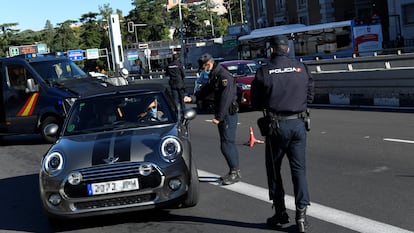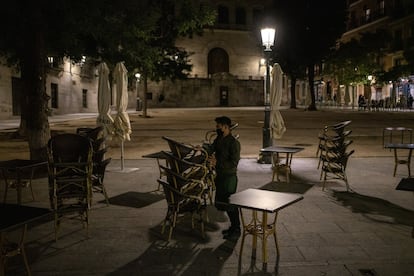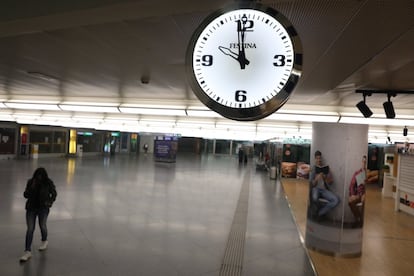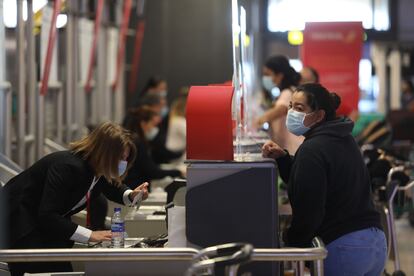Confusion but no chaos, as Madrid sees new coronavirus restrictions implemented in 10 cities
On Friday night a perimetral lockdown went into force across the region, despite the opposition of the local government and the resignation of citizens

There was widespread confusion and doubts among the public in Madrid this weekend as new restrictions came into force on Friday night in 10 cities in a bid to slow the spread of coronavirus in the region, which was described last week by the Health Minister Salvador Illa as being at the “community transmission” stage.
There was not, however, a centrifugal effect: the exit roads from the Spanish capital were not packed with Madrileños escaping the city before the shutdown on Friday night. But minutes before the new rules came into force, the atmosphere changed. At 10pm hostelry venues were supposed to stop admitting customers, and close at 11pm. But from the looks of some neighborhoods on Friday night, it appeared that many Madrileños had opted to stay at home after a rainy, grim day.

“There were three of us waiters on an ERTE [government furlough scheme],” complained one bar employee. “Now I’m sure we’ll be back to part time,” he explained as he cleaned up with the door already closed.
Some residents did opt to leave the city for the weekend, on the basis that they didn’t know when they would be able to do so again. “We left at 5.15am,” explained Rosa, 43. “We went for our last weekend away because we might not be able to do so again for three months and we need to load up on fresh air. Above all for the kids, who knows how they would cope with another lockdown without going to the countryside.” They were planning on coming back on Sunday, as Rosa is a high school teacher. “We had it all planned…,” she added. “But now it’s turned into the last weekend away. We don’t have any contact with anyone there. And we left before the deadline,” she said.
The restrictions were introduced after weeks of battles between the central government, run by the Socialist Party (PSOE) in coalition with junior partner Unidas Podemos, and the regional government, which is headed up by the conservative Popular Party (PP) in coalition with center-right Ciudadanos (Citizens), and propped up by far-right Vox. Madrid premier Isabel Díaz Ayuso is fiercely opposed to a widespread lockdown of the region on the basis it would damage the economy. But with 35% of new cases registered in Madrid, despite having just 14% of Spain’s population, the central government has said it has been forced to act, passing the obligatory measures in the Official State Gazette (BOE).

Since Friday night, citizens living the Spanish capital and the surrounding cities of Alcalá, Alcobendas, Alcorcón, Fuenlabrada, Getafe, Leganés, Móstoles, Parla and Torrejón have been subject to a perimetral lockdown, only allowed to leave in certain cases, such as going to work or to the doctors. The measures, which affect 4,786,948, also mean that businesses such as bars and restaurants must close at 11pm, with consumption at bar counters prohibited and capacity limited to 50% inside and 60% on sidewalk terraces.
On Friday, the region’s justice chief Enrique López and health chief Enrique Ruiz Escudero held a joint press conference at which they confirmed that their government had filed an appeal with Spain’s High Court against the measures on the basis that they encroach on the region’s powers. By Monday lunchtime, the High Court had rejected the urgent suspension of the measures as requested by a private individual. The court will now consider the regional government’s request for them to be suspended, albeit not urgently.
During Friday’s press conference, López and Ruiz Escudero repeatedly warned of the “chaos” that the measures would cause, blaming the central government for the situation. On Saturday morning, however, there was no sign of that chaos at the Puerta de Atocha train station in the Spanish capital, a major transportation hub that is one of the arrival and departure points for the AVE high-speed train. One of the few passengers in the deserted station, Gelevi, from Dominican Republic, had landed in the city on Saturday morning and was waiting for a train to travel to Barcelona, where she would be visiting an aunt for a month. “I didn’t know anything about these restrictions,” she said. “Do I have to stay here? And when I come back, will I be able to catch my flight?”
The restrictions, in principle, will last two weeks, but once they have been in place for seven days they will be evaluated at a bilateral meeting of the central and Madrid regional governments.
In one of the cafés that nestles in the garden of Atocha train station, a waiter was standing with his arms crossed, with barely a customer stopping by for breakfast. “Empty? It’s deserted here. I would say 90% less, at least.” The lack of passengers was confirmed by Margarita, a security guard who checks tickets at the security point. “At the weekend there are usually fewer people, but this is something else,” she said. “They must be scared, I suppose, but you can travel from here without any problems. In fact, we haven’t been given any special instructions and there aren’t any police monitoring things.”

On the outskirts of the Spanish capital, a sign that reads “Without barriers” welcomes passengers to Terminal 1 of the Adolfo Suárez Madrid-Barajas airport. But there are in fact barriers – no one is allowed in the airport unless they have a ticket, as has been the case for months now. But apart from that, no one asks the reason for your journey or your place of origin. “Everything is the same, nothing has changed with my job,” one of the security guards confirmed. Until now there were temperature checks and medical questionnaires, but the new measures do not include any specific protocols. The ministries involved admit that a plan needs to be finalized that will control journeys that cannot be justified.
But there are unexpected signs of new life in the center of Madrid, despite the situation. The absence of tourists in the city has opened up new possibilities. On Friday night, just as the city was about to close, a new bar opened its doors. It’s called Anda Jaleo, and is in Unión street, just next to the Teatro Real opera house. Its owners have another establishment nearby, one that caters to locals and not tourists. Thanks to falling rents, they have been able to lease the new place for a 50% discount for the two first years. They had two members of staff on an ERTE, and with the new bar, they have been able to get them working again. “We trust that our family, which is the neighborhood, its residents, will keep coming,” explained José, one of the employees. The opening night saw the bar full. People came in to have dinner under one set of rules, and left at 11pm under another.
Based on reporting by Isabel Valdés, Manuel Viejo, Iñigo Domínguez, Nicholas Dale, Miguel Cantón and Cristina Saldaña.
English version by Simon Hunter.
Tu suscripción se está usando en otro dispositivo
¿Quieres añadir otro usuario a tu suscripción?
Si continúas leyendo en este dispositivo, no se podrá leer en el otro.
FlechaTu suscripción se está usando en otro dispositivo y solo puedes acceder a EL PAÍS desde un dispositivo a la vez.
Si quieres compartir tu cuenta, cambia tu suscripción a la modalidad Premium, así podrás añadir otro usuario. Cada uno accederá con su propia cuenta de email, lo que os permitirá personalizar vuestra experiencia en EL PAÍS.
¿Tienes una suscripción de empresa? Accede aquí para contratar más cuentas.
En el caso de no saber quién está usando tu cuenta, te recomendamos cambiar tu contraseña aquí.
Si decides continuar compartiendo tu cuenta, este mensaje se mostrará en tu dispositivo y en el de la otra persona que está usando tu cuenta de forma indefinida, afectando a tu experiencia de lectura. Puedes consultar aquí los términos y condiciones de la suscripción digital.









































